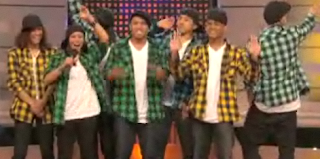 The 17th Annual Festival of Philippine Arts and Culture (FPAC) will be happening September 6-7 at Point Fermin Park in San Pedro, CA! Please visit the site at www.filamarts.org.
The 17th Annual Festival of Philippine Arts and Culture (FPAC) will be happening September 6-7 at Point Fermin Park in San Pedro, CA! Please visit the site at www.filamarts.org.The homey Kat Carrido came up with the brilliant idea of writing about our favorite FPAC moments. If you aren't familiar with FPAC, then you're missing out on an incredibly vibrant community event that brings together over a thousand artists and 25,000 audience members at the most beautiful park in California.
 When I first attended FPAC in 2005, I was most immediately surprised that the festival was organized by a cast of multigenerational members of our community. I was feelin that, because other large-scale Filipino community events seem to always be dominated by Filipinos of the older generation--which is not inherently bad. But, I believe neglecting second and third generation Fil Ams in community-building efforts mutes the creativity, energy, and perspectives of vital dimensions of the Filipino community. Plus, the voices of younger generations have a more up-to-date assessment of the community and can often contribute fresh ideas to the changing and transforming dynamics of any community. Therefore, including the collective voices of elders, parents, young professionals, and youth makes community-building ever more effective. Although every year can improve in certain aspects, FPAC has a healthy balance of elder, immigrant, 2nd/3rd generation, and youth components.
When I first attended FPAC in 2005, I was most immediately surprised that the festival was organized by a cast of multigenerational members of our community. I was feelin that, because other large-scale Filipino community events seem to always be dominated by Filipinos of the older generation--which is not inherently bad. But, I believe neglecting second and third generation Fil Ams in community-building efforts mutes the creativity, energy, and perspectives of vital dimensions of the Filipino community. Plus, the voices of younger generations have a more up-to-date assessment of the community and can often contribute fresh ideas to the changing and transforming dynamics of any community. Therefore, including the collective voices of elders, parents, young professionals, and youth makes community-building ever more effective. Although every year can improve in certain aspects, FPAC has a healthy balance of elder, immigrant, 2nd/3rd generation, and youth components. Pilipino Artists Network Pavilion murals (2007) Photo credit: Ernie Pena
Pilipino Artists Network Pavilion murals (2007) Photo credit: Ernie PenaAnother aspect of the festival which I admire is the clear focus of the organization: arts and culture. Unlike other large-scale Filipino community events, which often dwell on beauty pageants or talent shows, FPAC makes known its priorities, and is consistent with its mission. The good folks at FilAM Arts (the non-profit the runs FPAC) understand that art (visual, dance, music, crafts, poetry, literature) develops and transforms culture, which in turn can transform the state of our communities. In fact, compared to other ethnic-based groups in California, community-support for Filipinos come largely in the form of arts-initiatives.
I love FPAC! So what's my favorite FPAC moment? I would have to say it was when the Visionaries closed-out FPAC 2006. The youth were pumped in the front and the Visionaries were bangin all the anthems. The stage and the crowd barely dangled off the seaside cliff, the sun slowly setting into the ocean. Although the environment was incredibly serene, the energy of the crowd pulsated.
Before they did their last song, the Visionaries asked the youth to put two fingers in the air in a gesture of peace. As they did this, the Philippine flag waved in the sea breeze. I don't know what to say about the politics/meanings of the moment (are we at peace? what are the varying representations of the Philippine flag? etc.), but it was a gorgeous moment. Those questions could wait for later. That was my favorite FPAC moment.


If you been to FPAC, what was your favorite moment?



























